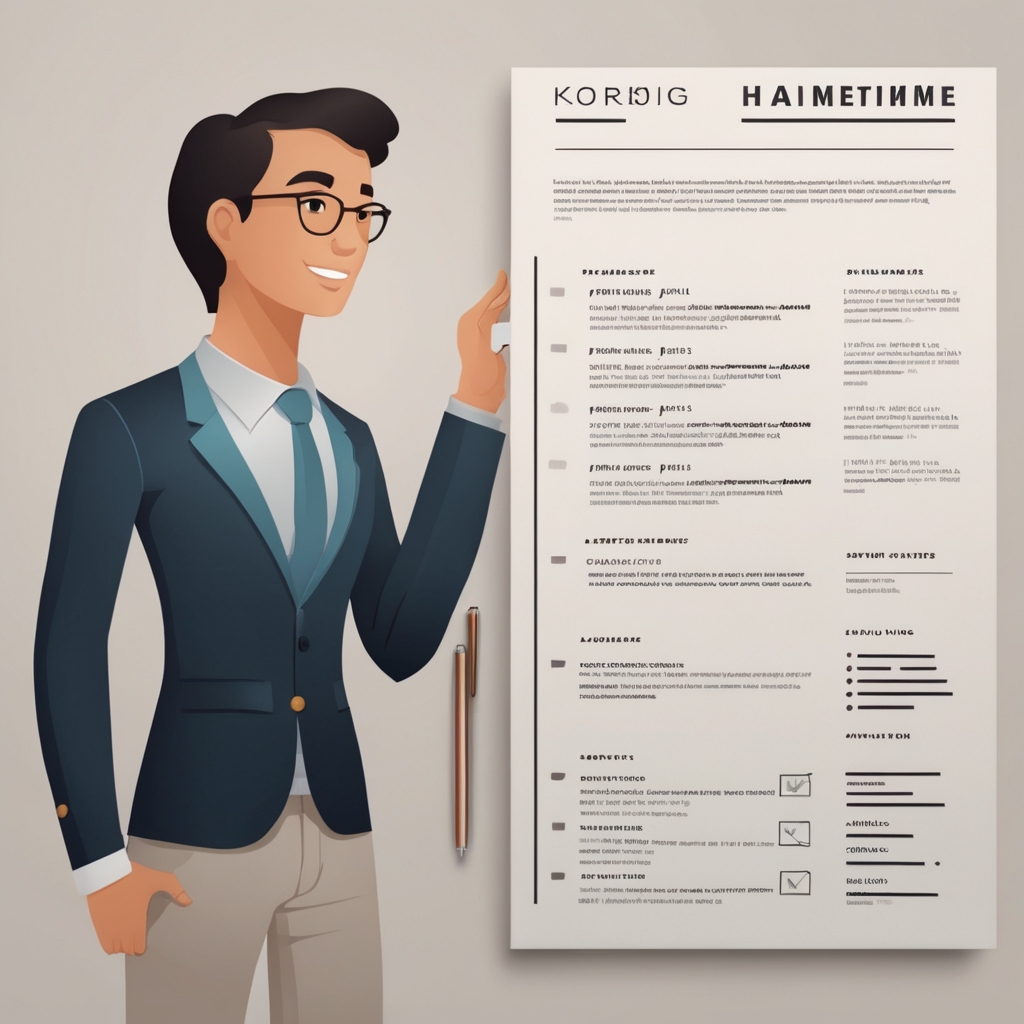Have you ever looked at your resume and realized how ordinary it looks? So when that dream job shows up, you start wondering: What if I just tweak a few things? Maybe “managed” instead of “helped.” Maybe I really did “lead” that project, right? After all, who’s going to find out?
So is it illegal to lie on your resume? The straight answer is no. But here’s the truth: lying on your resume can destroy your career faster than you think. Even small exaggerations can come back to haunt you in the form of revoked job offers, public embarrassment, or even legal trouble in some situations.
Before you decide to “edit reality” to land that job, let’s break down what actually happens when you lie on a resume — legally, ethically, and professionally. And more importantly, let’s talk about how Lightforth’s LightResume helps you stand out without ever needing to fake it.
What Counts as Lying on a Resume?
Lying on a resume isn’t just about fabricating a whole career. It can include any false, misleading, or exaggerated information you present to make yourself look more qualified than you are. Some examples include:
- Fake job titles: claiming to have managed a team when you were part of one.
- Inflated responsibilities: saying you “developed” something you only assisted on.
- Falsified dates: stretching employment periods to hide gaps.
- Fake degrees or certifications: listing a degree you didn’t complete.
- False technical skills: saying you know Python or Power BI when you’ve only watched a few tutorials.
- Manipulated achievements: claiming you increased sales by 50% with no actual data.
Even something as “minor” as changing your job title from “Assistant” to “Manager” is considered deception. And if discovered, it can do lasting damage to your professional reputation.
Is It Actually Illegal to Lie on a Resume?
Here’s the straightforward answer: Lying on a resume isn’t always criminal, but it can lead to serious legal and professional consequences depending on the situation.
1. If You Lie to a Private Company
In most private-sector jobs, lying on a resume won’t get you handcuffed. However, if that lie leads to financial or reputational damage for the company, such as, if you falsify credentials and perform tasks you aren’t qualified for, you could face termination or even civil action.
Employers have every right to fire an employee discovered to have lied on their application, even years after hiring. Some companies may also pursue legal action under fraud or misrepresentation laws, especially if the lie caused measurable losses.
2. If You Lie to a Government Agency
Here’s where things get serious. Lying on an application for a government role can be considered a crime under fraud statutes. In countries like the U.S. and U.K., falsifying qualifications for federal jobs or contracts can lead to fines or even imprisonment.
For example, if you claim a degree or certification that doesn’t exist while applying for a government position, that’s not just unethical, it’s potentially criminal falsification.
3. If You Lie About Degrees, Licenses, or Certifications
Falsifying academic credentials is one of the easiest lies for employers to verify, and it’s also one of the most damaging. In regulated industries (like healthcare, accounting, engineering, or education), it can lead to license revocation, legal liability, and blacklisting from future employment.
4. If You Lie and Get Caught Later
Even if you pass the initial background check, the truth tends to surface eventually. Employers often conduct re-verifications before promotions or when transferring employees to sensitive roles. Once the lie is discovered, it’s not just the current job you lose — you also risk damaging your credibility in the industry permanently.
How Employers Find Out When You Lie
Employers can be far more thorough than you think. The rise of HR tech, LinkedIn verification, and automated background checks means most lies are caught easily.
Here’s how recruiters typically uncover false claims:
- Reference checks: They call your listed employers and sometimes the company HR to verify job titles and employment dates.
- Background checks: Automated systems verify your education, work history, and even certifications.
- LinkedIn inconsistencies: If your LinkedIn doesn’t match your resume, it raises an instant red flag.
- Skills testing: Many roles (especially technical ones) now include practical tests. If you claimed proficiency you don’t have, it’ll show immediately.
- Social media: Recruiters often review your public posts and projects, especially if you claim online portfolios or leadership experience.
In other words, you might get through the first stage, but you probably won’t survive the next.
The Real Consequences of Lying on Your Resume
It’s tempting to think that resume embellishment is “just part of the game.” But when you’re caught, and statistically, you likely will be, the fallout can be brutal.
1. You Lose the Job (Sometimes Immediately)
Most companies have strict policies about falsification. If HR discovers a lie before hiring, they’ll simply reject your application. If they find out after hiring, you can be fired immediately which is one of the hardest things to explain to future employers.
2. Your Professional Reputation Takes a Hit
Word spreads fast in professional circles, especially if you work in a niche industry. Recruiters often talk, and once your name is associated with dishonesty, it can quietly close doors for years.
3. You Could Be Blacklisted
Some industries maintain internal records of candidates who falsify credentials or job histories. Once flagged, you may be blacklisted from applying to similar organizations in the future.
4. It Affects Your Confidence
Even if you don’t get caught right away, carrying a false narrative is stressful. You’ll constantly worry about being found out — and that fear can affect your interview performance, workplace relationships, and even long-term mental well-being.
Our top readers enjoyed reading: I Tried the 5 Best Online Resume Builders of 2025
Why Job Seekers Lie in the First Place
Most people don’t lie to manipulate or deceive. They lie because they’re scared. Scared of rejection, scared of not being “enough,” scared of missing out on a life-changing job.
Here are a few common reasons people resort to exaggeration:
- They feel underqualified: Maybe the job description lists 3–5 years of experience, and they only have two.
- They’ve been unemployed for a while: Gaps can make people panic and stretch dates.
- They’re switching careers: So they inflate past responsibilities to look more relevant.
- They feel pressure to stand out: In a world of “perfect” LinkedIn profiles, people think they need to compete with fake perfection.
But here’s the truth: you can absolutely stand out without lying. You just need to know how to position your real experiences strategically — and that’s exactly what Lightforth helps job seekers do.
How to Build a Powerful Resume Without Lying
If you feel like your real experience “isn’t enough,” you don’t need to fabricate it, all you need to do is to frame it better. Here’s how to do that effectively and ethically:
1. Focus on Transferable Skills
You might not have direct experience, but you likely have relevant skills. For example, if you’re applying for a data analyst role and your background is in customer service, highlight your work with metrics, Excel, and reporting.
Example:
Instead of saying “Handled customer calls,” try:
“Analyzed call data trends to identify customer pain points and reduce resolution time by 15%.”
You didn’t lie, what you did is that you just reframed your experience to show value.
2. Use Numbers and Results
Employers love measurable results. Even if you don’t have exact figures, estimate conservatively based on your impact.
Example:
“Helped improve team efficiency” → “Streamlined order tracking, reducing delivery errors by 20%.”
3. Tailor Your Resume to Each Job
You don’t need to lie to sound qualified; all you need to do is speak their language.
Study the job description and mirror its keywords in your resume naturally.
This is exactly what LightResume does automatically by analyzing your target role and helping you rewrite your resume so it passes both human and ATS screening, without exaggeration or guesswork.
4. Fill Gaps Honestly
If you have employment gaps, be upfront and focus on what you did during that time — freelancing, volunteering, upskilling, or personal projects. Honesty framed with growth always beats a lie wrapped in fear.
5. Let AI Help — Ethically
LightResume uses AI to enhance your existing experience — not fabricate it. It helps you highlight your real strengths, quantify your impact, and rewrite your resume in the language recruiters understand.
You’ll sound confident, experienced, and professional — without crossing ethical lines.
How LightResume Helps You Win Honestly
At Lightforth, we believe you shouldn’t have to lie to get noticed. You just need to present your truth better.
LightResume is built around that philosophy. Here’s how it gives you a competitive edge — the honest way:
- Smart keyword optimization: It scans your target job description and recommends the right industry keywords automatically — no keyword stuffing or guesswork.
- Achievement-based phrasing: It rewrites your bullet points into results-driven statements that show value instead of listing tasks.
- ATS compatibility: Every LightResume format is designed to pass Applicant Tracking Systems easily.
- Confidence-building summaries: It helps you describe your story powerfully without stretching the truth.
- Visual clarity: Clean, recruiter-approved templates that make your resume easy to scan and remember.
The result? A resume that tells your real story but in the strongest, most compelling way possible.
Honesty Wins (Especially in 2025)
The job market might be tough, but integrity is still the ultimate advantage. Employers don’t just hire skills, they hire trust.
When you lie, you gamble that trust away. But when you learn to present your truth effectively, you build credibility that lasts your entire career.
So if you’ve ever been tempted to stretch the truth on your resume, pause and remember: your real story has power. You don’t need to invent one; all you need to do is to express it well. Let LightResume help you do that. It’s not about faking confidence, it’s about finding it.
FAQs
1. What happens if you lie on your resume?
If you lie on your resume and your employer finds out, you can lose the job — even after you’ve been hired. It also damages your professional reputation and can make it harder to get future roles.
2. Do employers fact check your resume?
Yes, most employers verify your work history, education, and sometimes your skills through background checks, reference calls, or LinkedIn comparisons. Any inconsistencies can raise red flags.
3. Is lying on a CV illegal?
Lying on a CV isn’t always a crime, but it can become illegal if it involves falsified degrees, licenses, or documents — especially when applying for government or regulated positions.
4. Can you put fake experience on your resume?
No. Adding fake experience is considered dishonesty and can get you disqualified or fired. Instead of faking experience, focus on highlighting your real skills, volunteer work, or projects that prove your value.
5. How to identify fake resumes?
Employers can spot fake resumes by checking for inconsistent job dates, unverifiable companies, vague job descriptions, or skills that don’t match interview answers. Automated background checks and LinkedIn profiles also help confirm authenticity.





